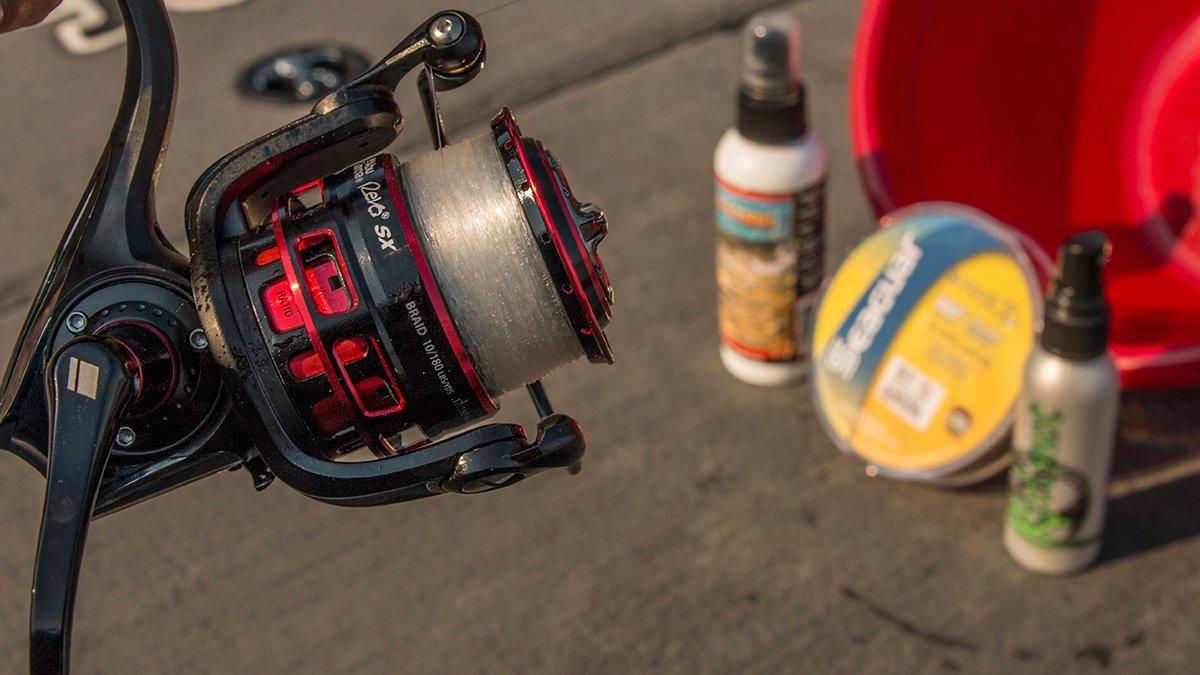If you frequently cast a spinning reel, you’re no stranger to periodic line tangles. Although recent advancements in fishing reel and line technology have drastically reduced the frustrations, you’re still bound to have line management issues throughout the fishing season.
Fortunately, there are three ways to drastically reduce spinning reel tangles. Even if you’re using relatively low-end fishing line, you’ll be able to use these inexpensive tricks to maximize your effectiveness on the water.
1. Watch for kinks when spooling
Whenever I’m spooling my spinning reels, I’ll open the bail and run the line through the bottom eye of the rod—the largest one closest to the reel—and tie a standard improved clinch or arbor knot to the reel spool. Next, I’ll lay the spool of line flat on the floor and close the bail of the reel.
I’ll then align the bottom rod guide—the one I fed the line through—about 24 inches above the full spool of line. As I slowly start reeling line onto the spool of my reel, I apply moderate pressure with the thumb and forefinger of my non-reel hand to ensure that the line is being packed tightly onto the spool.
After a few revolutions of the reel handle, drop your rod to within 18 inches of the spool of line to introduce slack into the line. You’ll notice a few loose coils due to the memory of the fishing line, but if you see any tight twists or kinks in the line, simply flip the spool of line over. For example, if the label was initially facing down, turn it over so the label is facing upward and vice versa.
These kinks cause a significant amount of line twist over time which, in turn, result in random—and nasty—line tangles.
2. Get a bowl of warm water
My dad taught me this trick when I was about 8 years old and when time allows, I use it each and every time I spool new line onto my spinning reels. I wish I had a scientific explanation for it, but I don’t—it just works, so I don’t ask any questions.
Instead of laying your fresh spool of line on the floor, this time you’ll set it in a bowl of warm water. You’ll spool it in the same manner that I mentioned earlier—still keeping an eye out for kinks—but using the warm water to increase the limpness of the line.
For whatever reason, this helps the line lay very tightly on the spool and does wonders for reducing catastrophic bird nests and tangles. When you try it, make sure you’re outdoors because you will sling a little bit of water throughout the process. I’ve found this method to increase the life of the line and have noticed absolutely zero affect on the tensile or knot strength of the line.
3. Line conditioner
Truth be told, I never messed with line conditioner until a few years ago. But I purchased some on a wild hair and a few years later, I use it religiously. Some folks think it’s unneccessary, but I have noticed a huge increase in both my castability and line management since I started using it.
After you spool your spinning reel using one of the methods listed above, spray about four or five sprays onto your reel’s spool and let it sit overnight—if you’re fishing Saturday morning, give each of your spinning reels a few shots before going to bed. Leave it alone and go to sleep.
When you get to the lake the next morning, you’ll enjoy a noticeable improvement. You’ll be able to cast a bit further, your line will lay compactly on the spool and wind knots won’t be an issue.
While I haven’t tried all of the line conditioners on the market, I can personally vouch for both Reelsnot and KVD Line and Lure Conditioner. I’ve been using these products regularly and they don’t harm the line or negatively affect its structural integrity in any way.
If you use at least two of the three methods mentioned, you’ll be hooked—no more random wind knots or giant, day-ending backlashes. Although these tricks are easy and very inexpensive, they’ll make a world of difference when you’re fishing with spinning reels.















